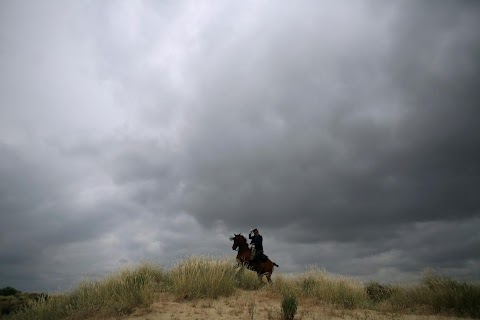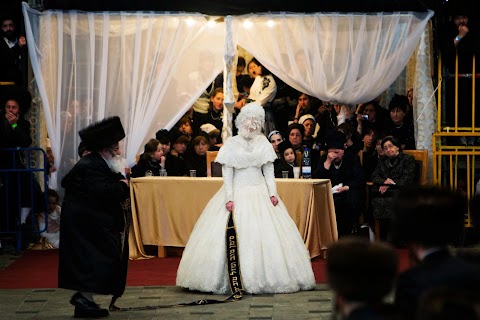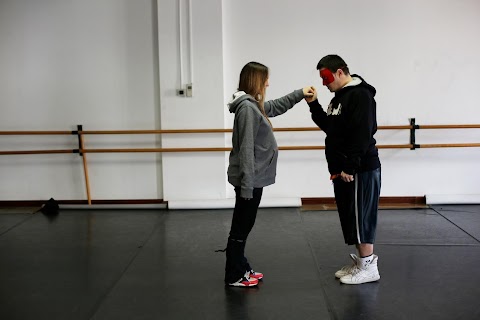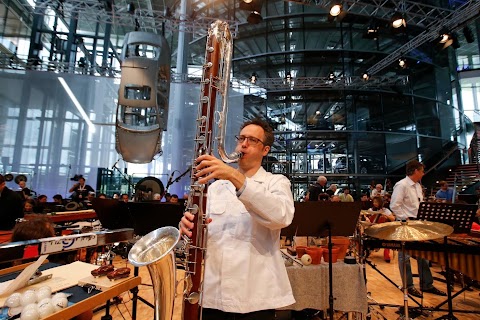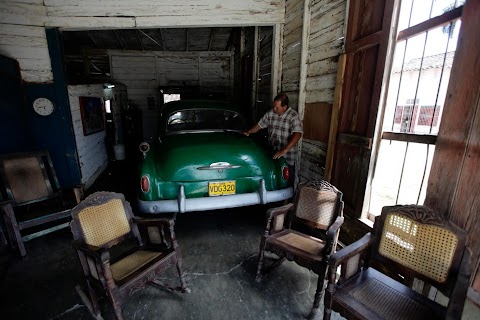
The love of his life
 Desmond Boylan
Desmond Boylan
Fidel Roque is a 53-year-old Cuban with one undisputed love: a 1952 U.S.-made Chevy that he affectionately calls “Senorita Verde” or "Miss Green".
Despite living on a meager salary in a crumbling, 100-year-old wooden house, Fidel says he will never consider parting with the car, which he has kept parked in his living room for over two decades.

“No way would I leave Miss Green outside in the street,” said Fidel, pictured polishing the car's windshield.
“Someone could crash into her, kids playing could break one of her windows, or a thief could steal her. There are too many chances of something terrible happening. I would not be able to sleep at night with the worry, so she is inside the house with me at all times.”
Slideshow

Cuba is famous for vintage cars like Miss Green, which have long stood out on the Caribbean island's streets as the result of former regulations stating that only automobiles in the country before the 1959 revolution could be freely bought and sold.

Fidel Roque bought Miss Green in 1990, and takes care to keep her clean and polished.

He has parked the car in the living room of his old, wooden house for the past 23 years.

Fidel worries that his rickety home could blow over during hurricane season, but he is unwilling to sell his car to raise money to repair it.

He shows the engine of his beloved automobile to two friends.

Fidel goes back to his car after stopping to refuel. ”Petrol costs one dollar for a litre, and I can do around eight kilometers per litre, so I cannot take her out so often,” he says.

Fidel sits in the car, which he only uses for special occasions or to travel long distances. For shorter journeys he rides his Soviet-era bicycle.
"Miss Green is Fidel’s great love. He can see her parked in the living room as he lies in bed watching TV."
I know a Cuban man named Fidel who is tall, well built and hardworking. He is known to have had several wives and many girlfriends over the course of his lifetime, and he now has a pregnant daughter who will make him a grandfather very soon, but these details of his life are scattered and vague.
What he does admit to, however, is the undisputed love of his life: she is called Senorita Verde, or Miss Green.
Fidel gets on well with his neighbours, likes telling jokes and is always in a good mood. At times he looks a bit nostalgic or sad since his house is badly in need of repair and he worries the whole structure may fall down on him and Miss Green during the heavy rains and strong winds of the new hurricane season.
People have offered to pay him for Miss Green so he can repair his crumbling 100-year-old wooden house, but he remains defiant. “I will never sell Miss Green. Just the idea of selling her makes me shiver,” he said. “People have no feelings.”
So who is Miss Green? She is Fidel’s 1952 green Chevy, which he has parked in his living room for the last 23 years.
Fidel, now 53 years old, bought the car in 1990 when the Cuban economy was heavily dependent on the USSR. The Berlin Wall had fallen a few months before but little did he know what extreme change was to come; the Soviet Union soon disintegrated and as a consequence Cuba plunged into a ten-year era of economic crisis known as the “Special Period,” characterised by an extreme lack of just about everything. Life for Cubans became a real struggle, but even so Fidel never budged when potential buyers made offers on his beloved automobile.
Fidel´s current salary as a driver for the Cuban public health system is extremely low, around 220 Cuban pesos ($8.30) per month, so he has more than enough trouble making ends meet.
“I could easily get around $7,000 for her right now, but the problem is I like eating well and I would eat what I made from her in no time,” he said.
“The result is I would put on even more weight and I would then be very sad without her. I can’t conceive of life without Miss Green.”
Things are gradually changing in Cuba. The economic situation is far better than the “Special Period” of the 1990s but there are still two stinging issues that many Cubans have to endure: poor housing conditions and precarious transportation. Fidel is struggling with both of these as best he can.
To get around, he has a Soviet-era bicycle from the 1970s, bought when he was 20 years old. It is another of his well-guarded possessions, and his main means of day-to-day transport. Miss Green is only for special occasions or longer distances, petrol permitting of course.
“I have had this bicycle for 33 years. It was in the first shipment of bikes that came to Cuba from the Soviet Union. It is rock solid. Imagine, the front tire lasted until last year when I had to replace it. I could not manage without my bicycle,” he explained with pride.
Still, Miss Green is Fidel’s great love. He can see her parked in the living room as he lies in bed watching TV and he keeps her clean and in working condition, caresses her curves, speaks to her, keeps her polished and never stops gazing at her.
As I was there, a friend of Fidel’s gave him a present of a couple of gallons of gasoline, and he was excited to be able to take Miss Green for a ride. With the petrol tank rusted and in repair, Fidel attached the engine’s gasoline tube to the plastic jug containing the precious fuel. He first took the car to buy a few more litres worth $6.80, just to be on the safe side.
I rode with him as he drove to visit friends 18 kilometers (11 miles) away in Sagua La Grande, central Cuba. During the ride, he got Miss Green up to 80 kilometers (50 miles) per hour without a problem. He was overjoyed.
“It’s very good for her to go for a spin now and then, otherwise the engine could suffer and the pistons clog up. Sometimes I turn on the engine in the living room for a few minutes, and other times I just ride around the block once or twice. When I have petrol then I go for a spin, but not too far,” he said.
When the conversation switched from cars to politics, however, Fidel, pulled faces and tried to change the subject. Nevertheless, I insisted, and he said: “I like my country a lot and I’m very proud to be Cuban, but let’s face it, things are bad now.
“But they have been much worse and other countries are suffering a lot due to the global economic crisis. We aren’t as much since we are used to surviving, and we notice there is a gradual improvement. I feel safe and happy here and people always help each other, and even though my salary is low this country is not as bad as foreigners portray it,” he said.

Fidel drives Miss Green home.





